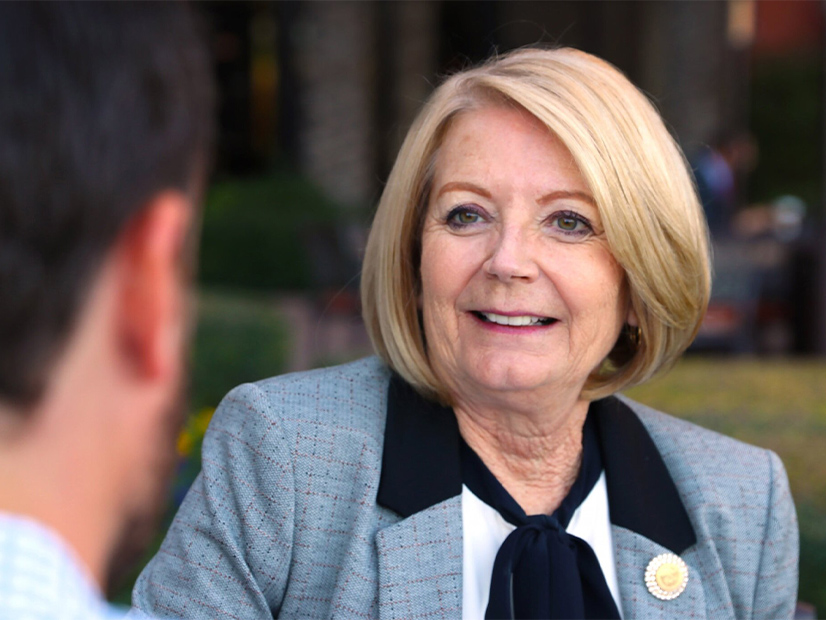The Arizona legislature passed a bill this week that would close the door to electric retail competition, but lawmakers indicated the conversation on deregulation is not over.
The state Senate on Tuesday passed House Bill 2101 on a 17-11 vote, with two senators not voting. The bill was transmitted Wednesday to Gov. Doug Ducey, who has five days to take action.
The same day as the Senate vote, House Speaker Rusty Bowers and Senate President Karen Fann announced the formation of a joint Ad Hoc Study Committee on Energy. The nine-member committee will meet after the close of the current legislative session, with a report due by Dec. 31.
“The interim work of the committee will enable future discussion of the state’s energy policies and the benefits and risks of energy ‘deregulation’ by providing a robust base of knowledge for policymakers and regulators,” Bowers and Fann said in a joint statement.
The committee will discuss the reliability and affordability of diverse power generation, transmission and distribution resources. Arizona’s governance over electric generation and transmission will be another topic.
Customer Choice
HB 2021 would repeal a 1998 law that was intended to give customers a choice of electricity service providers in the service territories of both investor-owned utilities and consumer-owned “public power entities” (PPE).
But rules that the Arizona Corporation Commission (ACC) adopted to allow competition were shot down by a 2004 appellate court ruling. And proponents of HB 2101 say competition should be rejected to maintain reliable electric service.
The bill, sponsored by Rep. Gail Griffin (R), comes as an application from Green Mountain Energy is pending before the ACC. Green Mountain, a renewable energy company, applied in August to provide competitive electric generation services within the territories of the state’s largest investor-owned electric utilities, Arizona Public Service and Tucson Electric Power.
HB 2101 had its ups and downs in the legislature, as proponents scrambled to gather enough votes.
The House passed the bill in February on a 37-21 vote — after rejecting the bill earlier that month but passing a motion to allow reconsideration. (See Retail Anti-competition Bill Hits Snag in Ariz.)
Similarly, the Senate shot down HB 2101 in March, but passed a motion to allow reconsideration.
During Tuesday’s floor session, several senators commented on why they switched their vote or stuck with their previous decision.
Sen. J.D. Mesnard (R) said HB 2101 would remove a statute that was not working, and his vote in favor of the bill had not changed. Mesnard said he generally supports free-market policies and would have preferred to have a replacement for the deleted statute. He said he’s hopeful that the interim committee will make progress in that regard.
“I’m going to be … very interested in a replacement and be an advocate for creating more competition, more choices for our ratepayers and our consumers,” Mesnard said.
But Sen. Lisa Otondo (D) questioned the timing of the interim committee. She remained opposed to HB 2101.
“Since when do we do an ad hoc committee and stakeholder meetings after the bill has passed?” Otondo said. “What a slap in the face. I vote ‘no.’”
Sen. Tyler Pace (R), who voted against the bill last month but in favor of it on Tuesday, said he had spent dozens of hours studying the issue. Electric retail competition is different from competition in other retail markets, he said.
“This idea that somebody in the middle can just buy energy from whoever they want and then sell it to whoever they want without ever producing and without ever actually laying the wire is not, in my personal or business opinion, a reliable market,” Pace said. “Because when something does go bad, there are some issues with that business model.”
Transparency Concerns
Pace and Otondo both noted a lack of transparency around the bill.
“It was sold as a simple fix to remove defunct statutes from the books, so that the [Arizona] Corporation Commission couldn’t deregulate the energy market and cause a catastrophe, like what we saw in Texas last winter,” Otondo said.
Otondo said she later learned that the utility pushing the bill was involved in antitrust litigation. The utility had been sued by customers with rooftop solar, who were being charged up to 65% more than customers without it, she said.
Otondo didn’t name the utility in the case but seemed to be referring to Ellis v. Salt River Project. HB 2101 would repeal a section of statute that says the Uniform State Antitrust Act applies to a PPE’s competitive electric generation service and other services.
Outside of the legislature, the business group Advanced Energy Economy called “phony” claims that HB 2101 was needed to increase energy system reliability. The group opposes the bill.
The bill does “next to nothing to strengthen the power grid,” AEE Principal Shelby Stults said. “It’s just a way for utilities to reinforce their control over Arizonans’ energy choices.”
If Arizona wants to improve reliability, it should look into joining a Western RTO, Stults told RTO Insider. That would allow more renewable energy to be incorporated in a reliable manner, she added.
Mark Parsons, Green Mountain’s vice president and general manager, said Arizona residents have indicated they want a choice of energy providers. The state has avoided aggressive governmental mandates for clean energy, he said.
Parsons urged Gov. Ducey to reject the bill.
“We are disappointed that HB 2101 repeals the statutory basis for us to receive a license to operate in the state,” Parsons said in a statement following this week’s Senate vote. “That is a legal prerequisite for us to be able to do business.”




